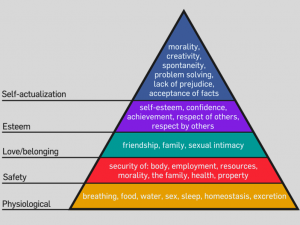I’ve written about Maslow and links between humanistic psychology and software testing a couple of times before. I presented ‘A Testers Hierarchy of Needs’ at TestBash 2.0. This post gives a bit more information and material to support the slides which you can find on this page.
The idea is that the headings match the slides, in order to make things easy to follow. It’s split into two posts – the first talks about humanistic psychology and Maslow. The second will focus on how we can adapt this to software testing.
Abraham Maslow, Humanistic Psychology and Testing
Abraham Harold Maslow was an American psychologist who died in 1970. He was best known for creating Maslow’s hierarchy of needs, a theory of psychological health predicated on fulfilling innate human needs in priority, culminating in self-actualization. He stressed the importance of focusing on the positive qualities in people, as opposed to treating them as a “bag of symptoms”.
The needs of humans, in their most basic form
Humanistic Psychology focuses on the needs of human’s in their most basic forms. It focuses on the positive qualities in people in a positive way and is based upon observations of humans’ innate curiosity – innate curiosity, something useful for testing I’d argue. Consider the classic “Testing is questioning a product in order to evaluate it” for example.
Maslow studied what he called exemplary people such as Albert Einstein, rather than mentally ill or neurotic people. He also studied the healthiest 1% of the college student population.
Humanistic theories of self-actualization
Humanistic psychology is a perspective which rose to prominence in the mid-20th century in response to Sigmund Freud’s psychoanalytic theory. Maslow once commented: “It is as if Freud supplied us the sick half of psychology and we must now fill it out with the healthy half”. Humanistic psychologists believe that every person has a strong desire to realize his or her potential, to reach a level of “self-actualization”
It holds that people are inherently good.
Qualities of self-actualizing people
Maslow studied what he called self-actualised people. He realized that all the individuals he studied had similar personality traits. All were “reality centered,” able to differentiate what was fraudulent from what was genuine. We do that as testers. They were also “problem centered,” meaning that those treated life’s difficulties as problems that demanded solutions. We do that as testers. These individuals also were comfortable being alone and had healthy personal relationships. Are we like that as testers? 🙂
Self-actualizing people tend to focus on problems outside themselves; have a clear sense of what is true and what is false; and are spontaneous and creative..
The Theory of Needs
The theory of human needs can be expressed or ordered in a pre-potent hierarchy—a pressing need would need to be mostly satisfied before someone would give their attention to the next highest need. Maslow described human needs as being relatively fluid—with many needs being present in a person simultaneously.
1) At the bottom of the hierarchy are the “Basic needs or Physiological needs” of a human being: food, water, sleep and sex.
2) The next level is “Safety Needs: Security, Order, and Stability.” These two steps are important to the physical survival of the person.
3) The third level of need is “Love and Belonging,” which are psychological needs.
4) The fourth level is achieved when individuals feel comfortable with what they have accomplished. This is the “Esteem” level, the need to be competent and recognized, such as through status and level of success.
5) At the top of the pyramid, “Need for Self-actualization,” occurs when individuals reach a state of harmony and understanding because they are engaged in achieving their full potential.
Once a person has reached the self-actualization state they focus on themselves and try to build their own image. They may look at this in terms of feelings such as self-confidence or by accomplishing a set goal.
Usually people in developed countries focus on the third and fourth level of needs while those in less developed worlds focus on the first and second.
Meta-motivation
Maslow used the term metamotivation to describe self actualized people who are driven by innate forces beyond their basic needs, so that they may explore and reach their full human potential. To become better people. Or better Testers.
But how does this fit in with Software Testing? We’ll find out more in part 2.

One thought on “Further Notes From A Testers Hierarchy of Needs – pt1”